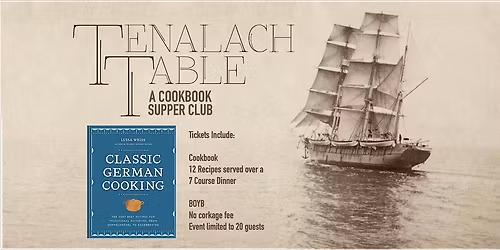Fall Supper Club - Classic German Cooking by Luisa Weiss
Schedule
Sun Jan 18 2026 at 06:00 am to 09:00 am
UTC-05:00Location
2006 Bayhill Dr | Charleston, SC

About this Event
The Dinner ...
My central belief is that good food is a cure-all, but good food shared with others can be all-together magic. As with many things (art, theater, music) it is the sharing of an experience that elevates it from mundane to exceptional. This, at its heart, is the objective of Supper Club.
The dinner is held at our private home and is intended to be a place of shared experiences, be they between strangers or old friends. Dependent on weather the long table is either set in the garden under the cafe lights, or by the fire in our mid-century modern home. We serve on my husband's grandmother's antique china and take great joy in curating flowers and music inspired by the cookbook being sampled.
Each cookbook sampled is selected for the story associated with it. These stories could be the exploration of a culture or place, a celebration of an iconic chef or restaurant, or a foray into a specific cooking style.
Our goal is to not only explore the story associated with the cookbook, but also comprehensively sample its recipes, all while delivering a cohesive progressive menu. Guests are encouraged to BYOB to accompany their meal. We strive to include at least one recipe from each section of the book, as well as equally representing key ingredient categories (starch, veg, fish, meat, sweet).
We prioritize sourcing our ingredients from some amazing local vendors, including (but not limited to) Fire Ant Fram, Abundant Seafood, Teds Butcher Block, Cuda Co, Spade & Clover, Moonrise Bagle, Out of the Weeds, Super Mushroom Bros, Tidewater Farm & Baguette Magic.
When possible, attendee requests (e.g., allergies/preferences) are incorporated into the final menu selections. The Agenda of this event includes a sample of the dishes that may be served.
The Cook ...
My childhood was spent cooking out of our family's garden in Seattle, WA (from the age of six my brothers and I were each responsible for one family dinner per week). I worked my way through collage freelancing for catering companies and as a part-time prep cook for a local natural foods market where I not only learned the ins and outs of a professional kitchen, but also gained a real appreciation for the difference of home-made versus processed pre-packed food. I also quickly learned that while I love to cook, the hours and stress associated with the restaurent scene was never going to be condusive for raising a family or pursuing my other interests.
I started Supper Club in 2022 at the urging of friends who were (I think) tired of hearing me bemoan the impossibility of testing a cookbook. Making a sufficient amount of dishes is not only costly, but a small family of 4 can never consume that much food without spoiling. I had (and still have) a serious cookbook addiction and the first year we sampled 11 cookbooks already in my collection. It was an amazing experience meeting food enthusiasts (as well as tourists) in Charleston, and growing my skill and confidence at curating and producing a tasting dinner experience for our guests. By 2023 I was mixing in some new release cookbooks in with my existing collection thanks to the incredible curation of our local bookstore Itinerant Literate Books.
The Cookbook ...
Luisa Weiss is an Italian and American food writer based in Berlin, Germany. She is the creator of The Wednesday Chef blog and author of the critically acclaimed memoir, My Berlin Kitchen, and baking book, Classic German Baking. She grew up in Berlin and Boston and graduated from Tufts University with degrees in English and French literature. She spent a decade working in book publishing in New York and was Harper’s BAZAAR Germany’s food columnist for four years.
"... Over time, geopolitical events from all four directions influenced the German diet. To simplify it somewhat: The northern spice routes via the Hanseatic League brought things such as cinnamon and cardamom to the German sweet kitchen; from the west came braised and roasted meat; from the south came noodles and dumplings; from the east came cucumbers, caraway, and paprika. Knights returning from the Crusades introduced saffron, pepper, and raisins. A particularly impressive example of culinary influence is from the French Huguenots who fled to Berlin and Brandenburg in the seventeenth century after the revocation of the Edict of Nantes. I once saw their contribution illustrated at an exhibit at Berlin’s Märkisches Museum, which is devoted to the history of the city and surrounding region. A long table was filled with the foods those French Protestants introduced to Berlin—meat patties, asparagus, button mushrooms and porcini, carrots and cabbage, pears and apples, green beans and cauliflower, white bread and Mischbrot, which is a blend of white and rye flour bread. Even the cream puff! One shudders to think of what the average Berliner was eating before the arrival of the French.
And perhaps the most famous addition to German cuisine: potatoes. Today potatoes are such a part of German identity that a derogatory term for Germans by non-Germans is Kartoffel (potato) but potatoes weren’t part of the German diet until the eighteenth century, when Friedrich II, king of Prussia, ordered Germans who were suffering under recurring famines to start eating the tuber of a plant that they had largely considered only decorative since its importation from Spain in the mid-sixteenth century. (It turns out they were cooking the tubers wrong.) Today, as a token of gratitude, visitors leave potatoes on the gravestone of Friedrich II in the gardens of his pleasure palace Sanssouci in Potsdam..." - Introduction, Classic German Cooking, by Luisa Weiss
Where is it happening?
2006 Bayhill Dr, 2006 Bayhill Drive, Charleston, United StatesEvent Location & Nearby Stays:
USD 103.22



















